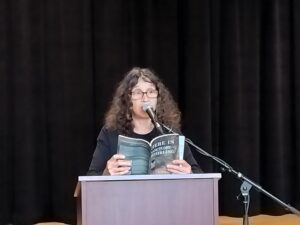For the past several weeks I’ve been struggling to figure out how to use this blog to promote my recent podcast and radio interviews in an engaging way that will mean something to others, but I keep getting sidetracked by things I’d rather write about.
Today, instead of self-promotion, I’m feeling called to talk about blueberries.
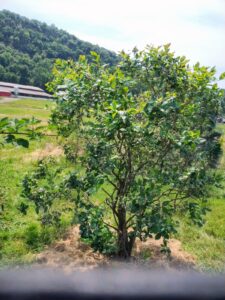
Photo: D. Dina Friedman
Our blueberry bush is one of the earliest blooming bushes I’m aware of–most of our friends, neighbors and surrounding farms don’t have blueberries until July. Ours has typically started at the end of June, but that date has inched up over the last few years, likely due to climate change. Our harvest season is short–around 2-3 weeks–but the blueberries are the best: crisp (not mushy) juicy, and a perfect mix of tart and sweet.
We pick the blueberries every day–sometimes twice a day–to make sure to catch each of them at the perfect stage of ripeness. It’s a slow, meditative process that I totally love, though in the current heat wave we’ve only gone out in the early morning or just before sunset. It’s been taking close to an hour to get a whole pint, which makes me think of the pressure on blueberry pickers on commercial farms. Of course, with their volume, they’re likely to be less discriminating in what they pick in order to make a profit. And this makes me think of the profit-making motive in writing, the people who make their living churning out one to two formulaic novels per year, or those whom publishers have deigned as destined for celebrity status, or actual celebrities whose books sell well even if they’re badly written or dependent on the skills of a ghostwriter.
While I’ve made it a theme of this blog to recognize and counteract perfectionism, I’m not ready to do this when it comes to blueberries. For me, they’re not a commodity; they’re a delectable treat. And while I know it’s a good idea to let go of the pinnacle of perfectionism when writing, I’m not ready to give up the joy of scaling the cliff in search of artistic excellence, even if it takes a long time and I never quite get there.
And as for the commodity thing–oh yeah, self promotion, as in throw some more mud at the walls and see what sticks–some marketing seminars I’ve been to have insisted that getting on lots of podcasts is the key to author success. While I highly doubt that, I did enjoy talking about political poetry on WMUA’s Poem Talk–both mine and this amazing poem by Jane Hirshfield. I also loved talking about perfectionism and my piano journey in this video from HerStory Circle and on Emma Lynn Dowd’s radio show (Episode 56, starting around 15 minutes in). If you feel moved to listen to any of these, enjoy!
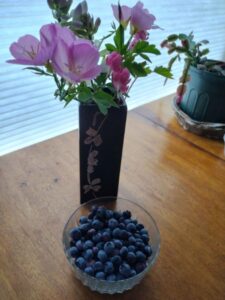
Photo: D. Dina Friedman
If not, I hope you have a relaxing day dodging the heat, with a cold glass of something and perhaps a few fresh blueberries.

 And when I arrived to take care of Manu, I was greeted by his parents with a strawberry rhubarb pie. (Strawberries are an important birthday theme for me, since it’s strawberry season here in western Mass.)
And when I arrived to take care of Manu, I was greeted by his parents with a strawberry rhubarb pie. (Strawberries are an important birthday theme for me, since it’s strawberry season here in western Mass.)

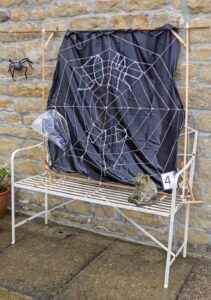



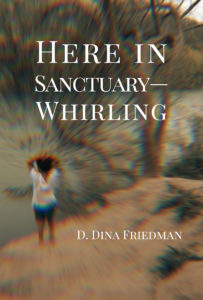 But now that I’m–thankfully–about 80% recovered, and preparing for my
But now that I’m–thankfully–about 80% recovered, and preparing for my  He was reportedly the only person in weeks that people had heard about who received a positive outcome form the infamous tent courts. And as witnesses gathered around to offer him a place to stay for the night and assistance to get to his brother in Florida, he told us the key to his “success.” I told them the gangs had killed my entire family. Other than my brother, I have no one.
He was reportedly the only person in weeks that people had heard about who received a positive outcome form the infamous tent courts. And as witnesses gathered around to offer him a place to stay for the night and assistance to get to his brother in Florida, he told us the key to his “success.” I told them the gangs had killed my entire family. Other than my brother, I have no one.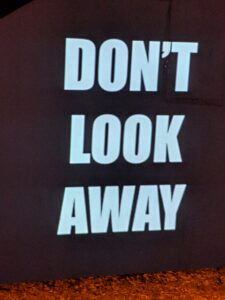 Don’t Look Away! the sign read on the American side of the border, where witnesses stood every day, reminding us of our responsibility not to tune out.
Don’t Look Away! the sign read on the American side of the border, where witnesses stood every day, reminding us of our responsibility not to tune out.
